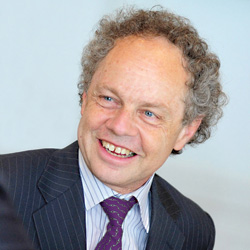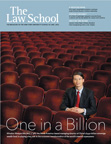 As I write this letter, I am a few months past my 10th anniversary as dean of the NYU School of Law. To mark the occasion, I sat down with Fred Bernstein ’94 this spring to talk about the faculty appointments, initiatives, and fundraising I worked on during my decade as dean, and how this great law school has become even greater. Fred’s story, “Dean of the Decade,” is complete with charts and graphs. There is still much more to accomplish! Recently the Law School’s board of trustees formed a strategy committee, which was tasked with examining our curriculum and making recommendations that both respond to and anticipate the changing legal environment and that will best equip students to be the leaders of the profession in the 21st century. There is no question in my mind that NYU School of Law will continue to offer the best legal education in the decades to come. Look for our bold announcements this fall.
As I write this letter, I am a few months past my 10th anniversary as dean of the NYU School of Law. To mark the occasion, I sat down with Fred Bernstein ’94 this spring to talk about the faculty appointments, initiatives, and fundraising I worked on during my decade as dean, and how this great law school has become even greater. Fred’s story, “Dean of the Decade,” is complete with charts and graphs. There is still much more to accomplish! Recently the Law School’s board of trustees formed a strategy committee, which was tasked with examining our curriculum and making recommendations that both respond to and anticipate the changing legal environment and that will best equip students to be the leaders of the profession in the 21st century. There is no question in my mind that NYU School of Law will continue to offer the best legal education in the decades to come. Look for our bold announcements this fall.
Our cover subject, Winston Ma (M.C.J. ’98), exemplifies the new global businessman. As you will learn when you read the fascinating profile written by Duff MacDonald, Ma had never been outside of China before he came to NYU to study at the age of 24 in what was then the new Hauser Global Law School Program. He has spent the last 15 years building on his NYU Law degree, creating a stellar global investment banking résumé that has enabled him to become a managing director of China’s $480 billion sovereign wealth fund. We were thrilled to have him back at Washington Square last winter to give the keynote at the annual Hauser dinner.
International issues have transformed the study of commercial law and bankruptcy as well, as writer Larry Reibstein makes clear in “Signature Issues in Commercial Law and Bankruptcy.” He engages with the dozen members of our faculty who specialize in this field as they examine questions about how to structure laws and contracts to enable the flow of sales between businesses and consumers, in both the traditional and online marketplaces, domestically and globally. And just as importantly, these professors work to design the best way to handle the bankruptcy and reorganization of failing multinational corporations. Not only are billions of dollars at stake, but so are the livelihoods of hundreds of thousands of people around the world. In each issue of the Law School magazine since I became dean in 2002, we have featured an area of law in which I am confident a peer review would say we take the lead among the top law schools; I am proud to add commercial law and bankruptcy to the lengthy list.
In such an interconnected global business community, ethics become even more critical to maintaining a well-functioning marketplace. The Law School magazine invited 10 professors and alumni who work as corporate counsel, prosecutors, and regulators to tussle over why corporate fraud appears to be rising, and how to turn the tide. Their lively discussion is transcribed and edited in “Cops and Robbers: The Corporate Edition.”
It is wonderful to work with an outstanding faculty that never ceases to amaze me with all that they accomplish. This year, not only did one of the nation’s leading capital defenders, our own Professor Bryan Stevenson, convince the Supreme Court to strike down mandatory life sentences without parole for juveniles, but the preeminent expert in China law, Professor Jerome Cohen, helped the U.S. State Department defuse a diplomatic crisis by bringing self-taught Chinese lawyer Chen Guangcheng to the Law School. Read more about our faculty in Faculty Focus. Also, Professor Vicki Been ’83, faculty director of the Furman Center for Real Estate and Urban Policy, who, as most of you know, is my wife, helped steer her center to earn a $1 million “institutional genius” award from the MacArthur Foundation.
To this impressive group we add three terrific new fulltime faculty members: Adam Samaha, a top constitutional law expert from the University of Chicago; Alan Sykes, a leading international trade expert from Stanford; and David Kamin ’09, a spectacular entry-level appointment who most recently worked at the White House as special assistant to the president for economic policy. We are also excited to welcome Intisar Rabb, who has a joint appointment between the Faculty of Arts and Science and the Law School; she is an authority on Islamic and comparative law. I’m thrilled by the arrival of these new colleagues.
As you spend time with this issue, I am confident you will see why NYU School of Law is such a vibrant, enterprising, and collegial institution. It is a great privilege to be at the helm!
